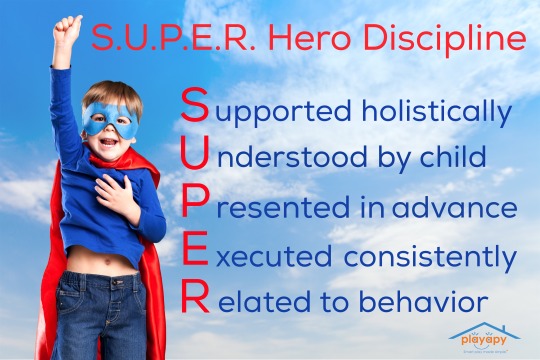
01 Jul S.U.P.E.R. Hero Discipline

Disciplining young children can be a frustrating experience. Many parents feel like they are doing it wrong and seek help and suggestions. My experience as a therapist has led me to create a simple way to remember key elements. These help parents have a positive and more productive experience when disciplining their children.
It is critical that discipline is presented in a way that allows both the child and the parent to be successful. Below I have listed 5 essential components required. The acronym SUPER is used to simplify this concept. It is also how I hope you will feel when you achieve the results you are seeking, like a super hero!
S is for Supported Holistically
Your body, mind, and soul must support any regulation that you set. This means you must be able to follow through physically, meet any expectation in relation to time, and be in agreement with whatever you state you will implement. For example, if you say to your child that you will take away their iPad for a week, you should stick with the week timeframe you stipulated.
U is for Understood by Child
The child must understand what the disciplinary action is. If the child doesn’t understand, you are setting your child up to fail. It helps to ask your child to repeat back to you what you say. That way you know your child was aware of your demand and the consequence.
P is for Presented in Advance
When possible, present the disciplinary action in advance. If you have a conversation with your child before a situation arises, the child will understand the expectation and aftermath before acting. For example, before going to a store, you can say that you expect good behavior or the privilege to go the next time will be lost.
E is for Executed Consistently
The most important part of discipline is honoring what you say. Children respond well when they sense consistency. If you execute authority consistently, a child will respect that you are sincere and can expect the consequence for his or her action.
R is for Related to Behavior
Discipline should be related to the behavior. If you attach penalties that have nothing to do with what the child is doing or not doing, it will not make sense to the child. It will be more difficult for you to execute. For example, you should not threaten to prevent your child from attending a party if the party is not related to your request.
I hope you find these tips helpful. If you have difficulty controlling the behavior of your child and need professional help, consider consulting with a behavioral or occupational therapist. Have a playful day!
Amy Baez, MOT, OTR/L
Amy Baez is a pediatric occupational therapist, award-winning handwriting author, and Founder of Playapy. For more information about Playapy services and products, visit www.playapy.com or email [email protected].
